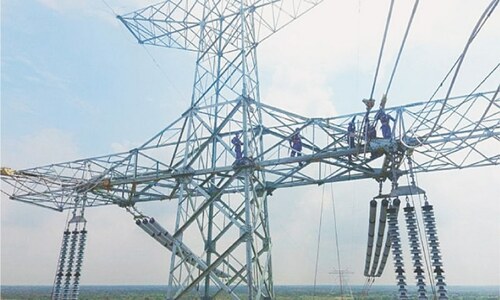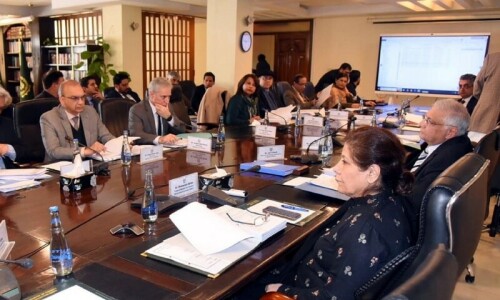KARACHI: From April onwards, the country has a substantial opportunity to increase textile exports and capture a larger chunk of the world market, says Pakistan Textile Exporters Association Patron-in-Chief Khurram Mukhtar.
He said there were two main areas that the incoming government should focus on to boost textile exports: electricity-related reforms and the availability of capital. Electricity prices for the export sector have been increased by 115 per cent from Rs20 per kWh to Rs43.07 kWh under the caretaker government. However, the Power Division has been working on a proposal to reduce the cut tariffs for the industrial sector recently.
On the one hand, the unprecedented interest rates have made borrowing prohibitively expensive. To curtail the stubbornly high inflation rates, the State Bank of Pakistan has kept the monetary policy rate at an all-time high of 22 per cent since June last year. On the other hand, the system of sales tax refunds is ineffective, causing a liquidity crunch.
“The refund system needs to be more efficient. The law needs to be implemented, which is not being implemented now,” he said.
“The government needs to ensure rupee-dollar parity,” says Saleem Parek, Director of Al-Abbas Fabrics. He adds that gas and electricity rates should be uniform as far as the cost of doing business is concerned, and the policy should be consistent for at least a year. Pakistan’s textile and clothing exports contracted by 14.63pc to $16.50bn in FY23.
However, exporters have been getting positive feedback from foreign buyers recently, says Mr Parekh, emphasising the need for export-friendly policies by the incoming government.
Demand in the international markets is improving as the economies of the West stabilise, and orders are starting to flow in.
Exporting utilities
“The government should completely ban the export of grey fabrics and yarn,” says Mr Parekh.
Given Pakistan’s energy shortages and high costs that hinder competitiveness, exporting low-value goods that consume scarce, expensive resources means the country is missing out on higher profit margins.
“Exporting raw materials is essentially exporting utilities,” asserts Mr Parekh.
Value-added exports, especially in the form of garments, should be our number one priority, he adds.
Currently, there appears to be an uptick in orders, stemming in part from the troubles that ail Pakistan’s textile competitors, creating windows of opportunity.
Bangladesh’s woes
Media reports indicate that Bangladesh is facing issues of fluctuating currency and higher costs of production. Their story is similar to Pakistan’s — the textile manufacturers lament the gas crisis driven by lower local production and a decrease in LNG imports due to falling foreign exchange reserves.
The recent protests to increase minimum wages for workers have also contributed to a higher cost of doing business.
Inputs have become more expensive as the Bangladeshi taka has weakened by roughly 30pc against the dollar over the past two years. But unlike Pakistan, Bangladesh does not grow cotton and so is more highly dependent on imported inputs.
Roughly half of Bangladesh’s exports are garment-related. The higher cost of doing business and the recent worker strikes that shuttered hundreds of firms have made its exports less competitive.
Trump and China
Earlier this month, as part of his election campaign, Donald Trump told Fox News that he aims to raise duties on imports from China by possibly more than 60pc if re-elected, echoing claims he’s made in recent months.
Trump is the front-runner for the Republican nomination in the US presidential race this year.
In 2019, before the pandemic and during the Trump administration in the US, 10pc punitive tariffs were imposed on about $300 billion of imports from China — including most textiles and apparel. A lot has happened since then, but the trade war between China and the US has not cooled.
China’s total exports to the US fell by 13.1pc in 2023 compared to a year earlier, marking their deepest decline in almost three decades, reports Hong Kong-based South China Morning Post. If Trump returns to power after the US elections in November, then it is possible that the ties will weaken further.
Meanwhile, the US economy has shrugged off fears of recession. In the second half of 2023, annual inflation fell back to the Federal Reserve’s target of 2pc.
The economy is driven by consumer spending, with real consumption spending increasing by 0.5pc in December, its fastest pace since January 2023.
Higher wages and a strong employment market mean there is demand for Pakistan’s textile exports if the country can capitalise on it.
April is the start of the new season for the textile sector. If the incoming government hits the ground running and sorts out these two main issues in the first 100 days of governance, Pakistan’s textile exports can receive a significant boost, surmises Mr Mukhtar.
Published in Dawn, February 9th, 2024
















































Dear visitor, the comments section is undergoing an overhaul and will return soon.